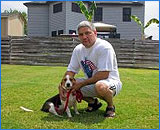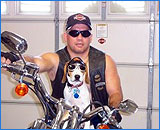If you are looking for the greatest gold-mine of easy to use "change your dog's behavior" advice ever crammed into a newsletter series then read on!
Also, make sure that you check out our 100% authentic testimonials from people who have bought Secrets to Dog Training and find out the massive difference it has made to their owner-dog relationship!
 "My dog Harley is a beagle, he is 5 months old, very active, aggressive and curious. Harley and I have been working the lessons from your book for at least three months now. We are very pleased about the results. I must say you cover everything that puppy gets into. The funny thing is when I see him behaving in a wrong manner I run to your book, look it up then apply the technique that pertains to the behavior, consistently and everyday until the results are automatic.
"My dog Harley is a beagle, he is 5 months old, very active, aggressive and curious. Harley and I have been working the lessons from your book for at least three months now. We are very pleased about the results. I must say you cover everything that puppy gets into. The funny thing is when I see him behaving in a wrong manner I run to your book, look it up then apply the technique that pertains to the behavior, consistently and everyday until the results are automatic.
 Harley (My beagle) is doing well now as a result of your wonderful step by step instructional book he is for the most part house trained, no longer digs, he sits, stays, heels and I understand his behavior much better. Harley and my families relationship is getting much stronger because we are all consistent with the same commands and your book guides us to understanding Harleys habits and reasons. Thank you Mr. Stevens for making the book simple, easy to understand and internet available."
Harley (My beagle) is doing well now as a result of your wonderful step by step instructional book he is for the most part house trained, no longer digs, he sits, stays, heels and I understand his behavior much better. Harley and my families relationship is getting much stronger because we are all consistent with the same commands and your book guides us to understanding Harleys habits and reasons. Thank you Mr. Stevens for making the book simple, easy to understand and internet available."
-- Rocky And Family Toves (USA)
Hi Daniel,
Jasper, a Jack Russell, is 10yrs old and almost completely blind. I am fostering him for a rescue charity with his sister and in order to find them a new home his problem needs to be sorted out.
Whenever we go for a walk he barks almost constantly and pants, whines and coughs throughout. Only quiets down when we get to a quiet area of park when we are away from traffic noises. I am starting to think it is because of his blindness (which is relatively recent) and he does these things because he can't see where these horrible noises are coming from, which makes him uncomfortable/panicky.
Along with the noisiness, he zigzags across the pavement and walks into things, gets under my feet etc. The amount of times I have accidentally trodden on him or he has walked into a lamppost is really upsetting. Spends the whole walk looking confused and distressed and I no longer enjoy walks, and it doesn't look like he does either. Makes things even worse for his sister as I can't walk them together because of this. She ends up getting pulled about as I am trying to keep Jasper out of the way of other pedestrians and out of the road.
The whole thing is an absolute nightmare and if they are going to be happy together and homed together I really need some help to sort this out as soon as possible. Thank you for taking the time to read this.
Regards,
Marion
Hi there Marion,
Thank you for your email regarding Jasper the Jack Russell you are fostering at the moment, and the trouble you are having with taking him for walks. These sorts of problems are very common for owners of blind dogs, as I am sure you can imagine. The behavior you have been seeing from Jasper is no doubt because of his current blindness, so there are no specific training techniques I can give you to try and help this problem. I can say that after some time adjusting to being blind, a blind dog will become a lot better on walks and will be able determine more easily where you are and where other people and objects are. It is of course up to you to be his guide on walks and to ensure he doesn't walk into solid objects or people. To help him recognize where you are, I recommend putting bells on your feet or legs, or at the very least being very 'heavy footed' with him so that he can hear your foot steps. This should help with the walks to some extent, and hopefully time sorts out the rest.
Alternatively, there are plenty of devices and harnesses available for purchase (many available online) that would be ideal for Jasper. For example a Blind Dog Hoop Harness is a great idea for a small blind dog like Jasper. Feel free to have a thorough internet search for more ideas.
Also be sure to walk Jasper along routes that are familiar to him. Blind dogs sometimes feel more secure with their leash attached to a harness around their body, rather than to a collar. Be aware that extendable leads can be hazardous. Many blind dogs benefit from the company of other dogs so it is great that his sister is still around and that they will be given out as a pair. You may also wish to train Jasper specific commands to help him negotiate his way around, such as "easy" when he approaches hazardous areas. Other important pertinent information for the management of blind dogs includes:
Always try to be reassuring and try to avoid loud noises/sudden movements. Ask people to talk to your pet gently before approaching them and take extra special care with children.
Try to keep the furniture in your home in the same place and do not leave obstacles in the way. Ensure that there are no potentially dangerous areas, e.g. sharp corners or high steps that can pose a hazard to an animal with poor vision.
Don't reprimand Jasper for his current behavior while on walks. He is obviously somewhat distressed and unsure of the whole ordeal. Perhaps it would be best to walk him either early morning or late at night when there are fewer people and other dogs around. If you can get another person to walk with you, they could take your other dog so that both dogs can walk at the same time.
Above all, patience is key for Jasper. When you do find a home for him, you will need to carefully explain the techniques for keeping a blind dog and how to care and walk him appropriately. They also need to realize that Jack will take some time to readjust to the new home and surroundings, as well as a new walk route that must be decided and used continually! You could also have your dog's eyes examined by a veterinarian ophthalmologist. Certain blindness’s can be corrected or improved through medications and/or surgery.
Best of luck with Jasper and getting him used to walking with you. Please let us know how you get on and the techniques you choose to use for his training.
Regards,
Daniel Stevens and the Secrets to Dog Training Team
"Secrets to Dog Training - STOP Dog Behavior Problems!"
 I've been a professional dog trainer for well over 20 years, and in that time I've helped thousands of dog owners just like you to get the friendly, well behaved, slipper fetching, best pal they always wanted.
I've been a professional dog trainer for well over 20 years, and in that time I've helped thousands of dog owners just like you to get the friendly, well behaved, slipper fetching, best pal they always wanted.
But it didn't start out that way. I've always loved dogs, some things never change. But when I first started my professional dog training career I relied on the so-called 'best practices' when it came to dog behavior training. It was only when I heard people tell me over and over again that they just weren't seeing results that I started to question the old accepted wisdom. So I started a journey, a quest to search out the best, most effective, techniques, tips, and tricks that really work.
And that's how I came up with Secrets to Dog Training. Year after year I found new techniques that achieved the results I wanted. Eventually I had a whole book worth of great resources: Secrets to Dog training...
So, if you want to:
Then Secrets to Dog Training is just what you've been looking for!
Previous newsletters
| 01 | 02 | 03 | 04 | 05 | 06 | 07 | 08 | 09 | 10 | 11 | 12 | 13 | 14 | 15 | 16 | 17 | 18 | 19 | 20 | 21 | 22 | 23 | 24 | 25 |
| 26 | 27 | 28 | 29 | 30 | 31 | 32 | 33 |34 | 35 | 36 | 37 | 38 | 39 | 40 | 41 | 42 | 43 | 44 | 45 | 46 | 47 | 48 | 49 | 50 |
| 51 | 52 | 53 |54 | 55 | 56 | 57 | 58 | 59 | 60 | 61 | 62 | 63 | 64 | 65 | 66 | 67 | 68 | 69 | 70 | 71 | 72 | 73 | 74 | 75 |